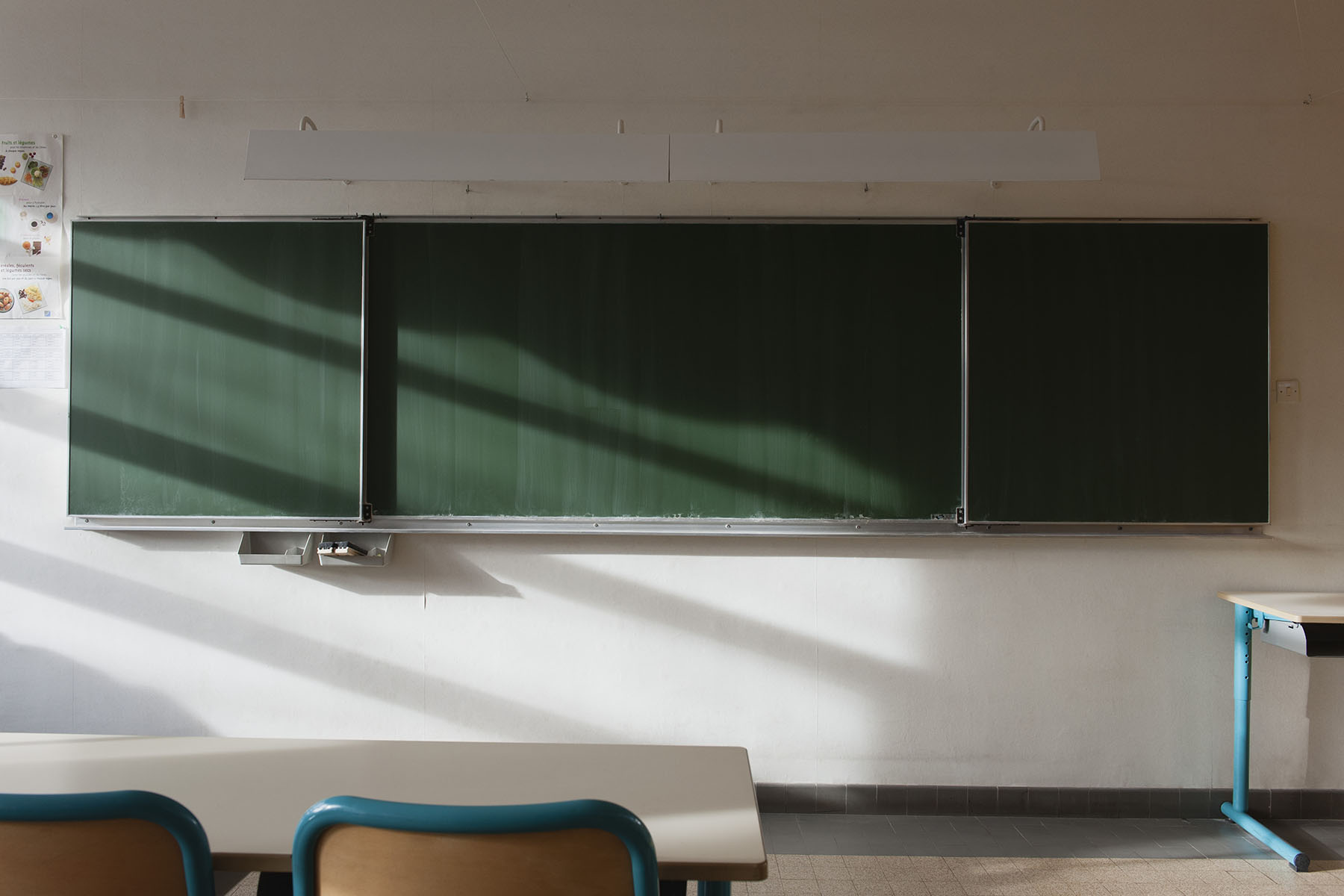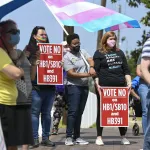Your trusted source for contextualizing LGBTQ+ and education news. Sign up for our daily newsletter.
At least 11 states have passed laws to censor discussion of LGBTQ+ issues in public schools, eliminating the potential for queer students to see themselves in their education. But most LGBTQ+ students haven’t been learning about their community in school anyway.
Instead, they’ve turned to the internet to learn about their identities as queer and trans young people. Some do online research about LGBTQ+ identities after learning from their friends or seeing representation in fiction.
In a new survey published in August, only 13.8 percent of 12,615 LGBTQ+ students said that their history classes had ever included a lesson, unit or chapter on LGBTQ+ history. The online survey, organized by the Human Rights Campaign Foundation and the University of Connecticut, mostly received responses from high school students, though some middle school and college students also participated. Students, the majority of which were in public schools, took the survey in 2022.
That such a small number of LGBTQ+ students have ever learned about queer history in school stood out as a key data point to Ryan Watson, an associate professor at the University of Connecticut and the lead researcher for the survey.
“Very few kids in schools see themselves represented in their curriculum, in their sex ed, in the history they’re taught about diverse populations. And this is surprising me because, at least since I’ve been an academic student, this is something we’ve been calling for,” Watson said. “A decade ago, we were calling for this.”
Watson said that diversity in school lessons and including LGBTQ+ voices is not part of a political agenda, but increasingly statehouses are getting involved. Five states this year passed “Don’t Say Gay” laws that ban classroom instruction on sexual orientation or gender identity, according to the Movement Advancement Project, which tracks LGBTQ+ policy. So far, two states — Florida and Kentucky — have issued a ban all the way up through 12th grade.
In Arkansas, the state’s “Don’t Say Gay” law applies through 4th grade, and in Iowa, students up to 6th grade are affected. Indiana’s law passed this year only reaches to the 3rd grade. Although Tennessee and Montana have not passed “Don’t Say Gay” laws, both states this year required parents to be notified of LGBTQ+ subjects in school.
These laws are fueled in part by rhetoric that portrays learning about LGBTQ+ identities at a young age as falling victim to “grooming,” or as being exposed to sexual material, or to a social contagion that will cause them to identify as gay or trans.
“I don’t know what data those folks who are trying to ban books and curriculum are referring to when they think these things are bad for our kids, because it’s not captured here in our data. Kids aren’t even receiving them,” Watson said.
In fall of 2021, Willie Carver’s high school students in Mount Sterling, Kentucky — near Lexington — were among those who had never been taught LGBTQ+ subjects in school before.
“My students had learned nothing and had never heard anyone say the words ‘gay’ or ‘trans’ before they had my class. I know this because they said so,” Carver said.
So, the teenagers took their education into their own hands.
After school, once a week for the entire year, the students at Montgomery County High — mostly 10th and 11th graders — taught themselves since no one else would, Carver said. The students were part of a student-founded club called “Open Light,” which Carver advised.
“They actually wrote a curriculum themselves. They took turns teaching concepts in LGBTQ history, women’s history and Black history over the course of the year. So this group of high school students actually taught themselves queer history,” he said.
In his own English classes, Carver assigned poetry readings written by gay people and about subjects that made it clear the author was gay, or the author’s LGBTQ+ identity would be included in their biographies. In the French classes that he taught, he would reference nonbinary pronouns to students and include LGBTQ+ people in example activities. Still, the amount of LGBTQ+ content in his curriculum was “negligible,” he said.
Carver felt a mix of emotions as he watched his students’ dedication to teaching themselves the histories that were missing from their studies. It was embarrassing to watch children try to do the job of professionals who couldn’t give them what they needed, but inspiring to see them care enough to want to do it, he said.
It was also a reminder of why some students don’t try in school, Carver said: Why would they be emotionally invested in sanitized curriculums handed to them by teachers who are afraid to teach?
“I experienced students desperate for actual information, but who instead sit in classrooms with worksheets that teach them nothing,” he said.
Carver, now an academic adviser at the University of Kentucky, left his teaching job last year after he says the school district failed to support him in the face of homophobia from locals in the community and accusations of “grooming” children by supporting LGBTQ+ students. He also felt harassed by school administrators for the few LGBTQ+ topics that he did teach during his time there.
In 2017 or 2018, Carver says he was investigated by the school because he included a Dolly Parton quote on a quiz that referenced drag queens. This kind of culture of suppression has always existed, he said — but it started becoming more intense in his town after former President Donald Trump was elected.
Kentucky passed one of the most extreme “Don’t Say Gay” laws, and one of the most extreme anti-trans laws, in the country this year. The law bans students, regardless of grade level, from receiving instruction that teaches them about gender identity or sexual orientation and combines that restriction with a state-wide ban on gender-affirming care for trans youth. The law went into effect this spring after the Democratic governor’s veto was overridden, and faces an ongoing lawsuit by LGBTQ+ and civil rights groups.
Other LGBTQ+ kids across the country have had to learn about their identities, and their histories, from sources beyond textbooks and classrooms.
Cass Crawford grew up in Austin, Texas, and moved with his family to St. Paul, Minnesota, last year — fleeing a state that has grown more hostile to transgender youth like himself. Now 16 years old, he had never heard a teacher mention LGBTQ+ issues or people until he was a sophomore in high school.
It was in an ethnic studies class with four other students at his new Minnesota school. That class included a brief unit focused on the discrimination that LGBTQ+ people face in day-to-day life. Crawford remembers the lesson taking up two to three days, and it didn’t include details or examples about LGBTQ+ history.
“I felt like I was the only one who cared at all,” Crawford said. It made him feel angry and alone, since other students in the small class did not join in group discussion about the LGBTQ+ lesson.
“Schools don’t teach about it. If you’re going to learn about it from not the internet, it’s most likely going to be a friend or a family member who tells you about it,” he said. And it’s rare, Crawford said, that LGBTQ+ kids learn about their identities from friends or family.
In the HRC survey, 82.5 percent of LGBTQ+ youth said that they had used the internet to find information about LGBTQ+ sexual health and behavior, while 95.3 percent said they had searched online to find information about their identity as an LGBTQ+ person.
Crawford’s uncle was gay, so that’s how he first learned about gay people — and then, when he read the “Magnus Chase and the Gods of Asgard” series by Rick Riordan — in which one of the characters is gender fluid — he learned that different kinds of gender identities were possible.
“The way he described that in that book, I related to that a lot. And so I started researching more into gender identities on Google,” he said.
He was in 4th or 5th grade, and never thought to himself that he should ask a teacher for information. None of them had ever mentioned LGBTQ+ people.
Gabe, a 25-year-old trans man who lives in Jacksonville, Florida, has never had a class that discussed LGBTQ+ history — including in college. He grew up in central New York, and recently got his bachelor’s degree in astrophysics in Florida. Gabe asked not to include his last name in this story since he’s worried about being subjected to violence in Florida if a stranger realizes that he’s transgender.
He’s seen only one mention of LGBTQ+ identities during his education — in a general health class in middle school back in New York. The topic of gender and sexuality was mentioned so briefly that he equated it to “the snap of a finger.”
At the end of the day, bans on LGBTQ+ curriculums are not going to keep students from learning what they want to know, Carver said.
“We’re all kidding ourselves. They have cell phones in their hands, and they talk to each other,” he said. “We ban it because we are fighting a proxy war on top of these students. Some people say that we’re fighting it in the schools, but really we’re fighting the students themselves.”







